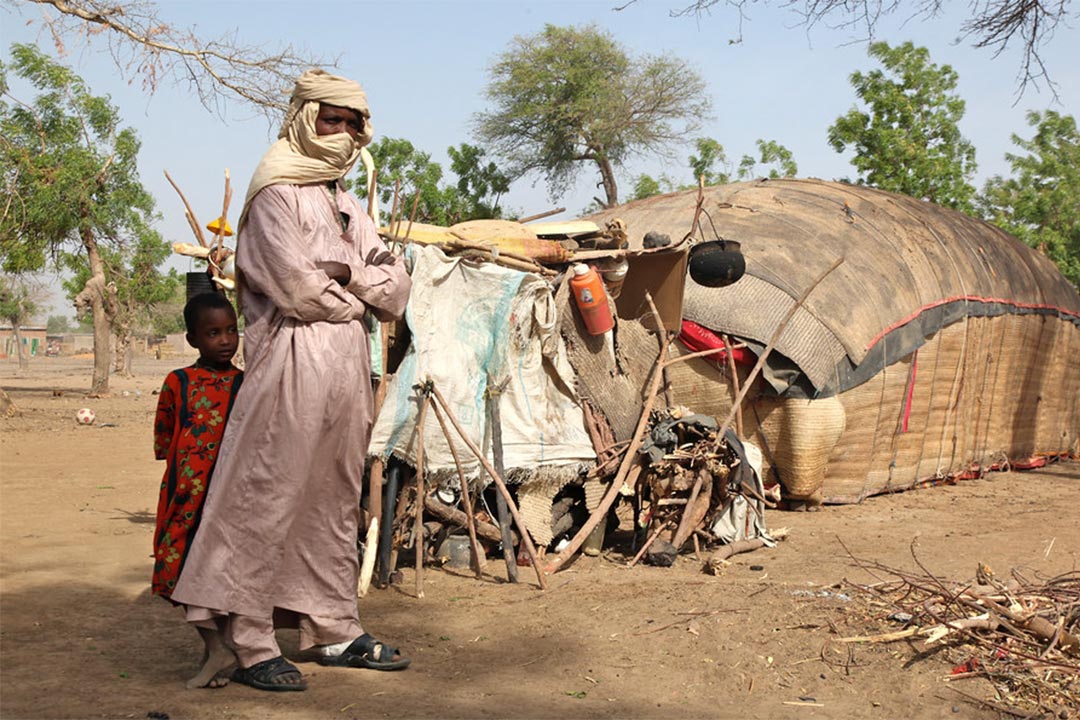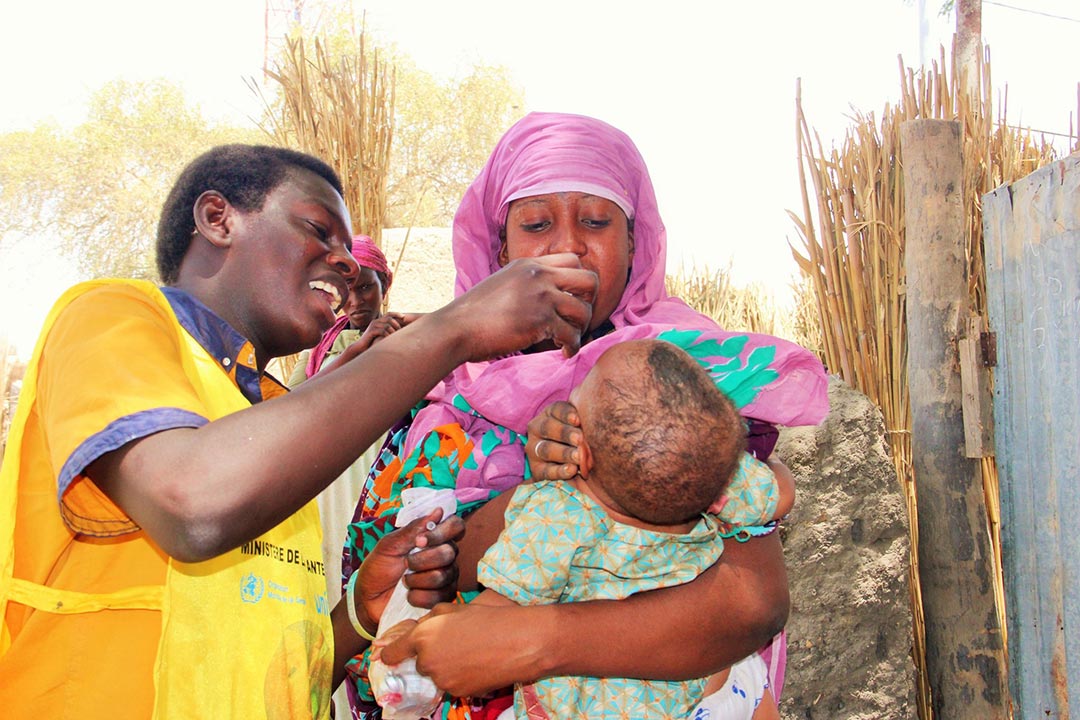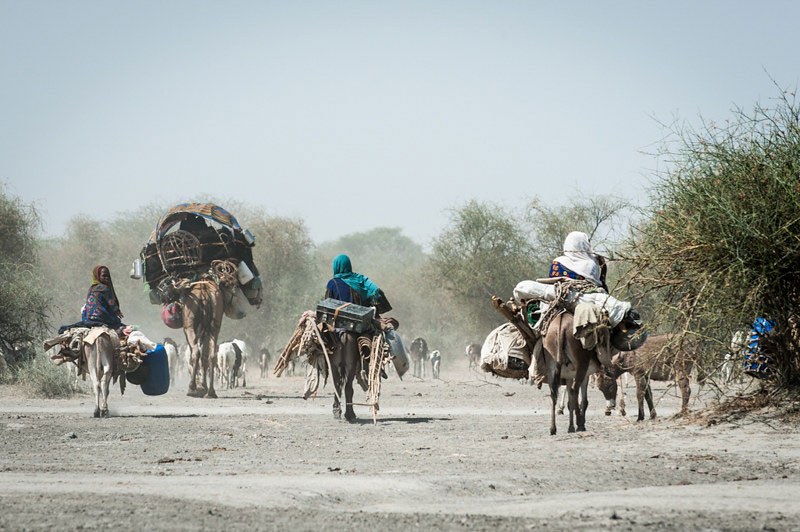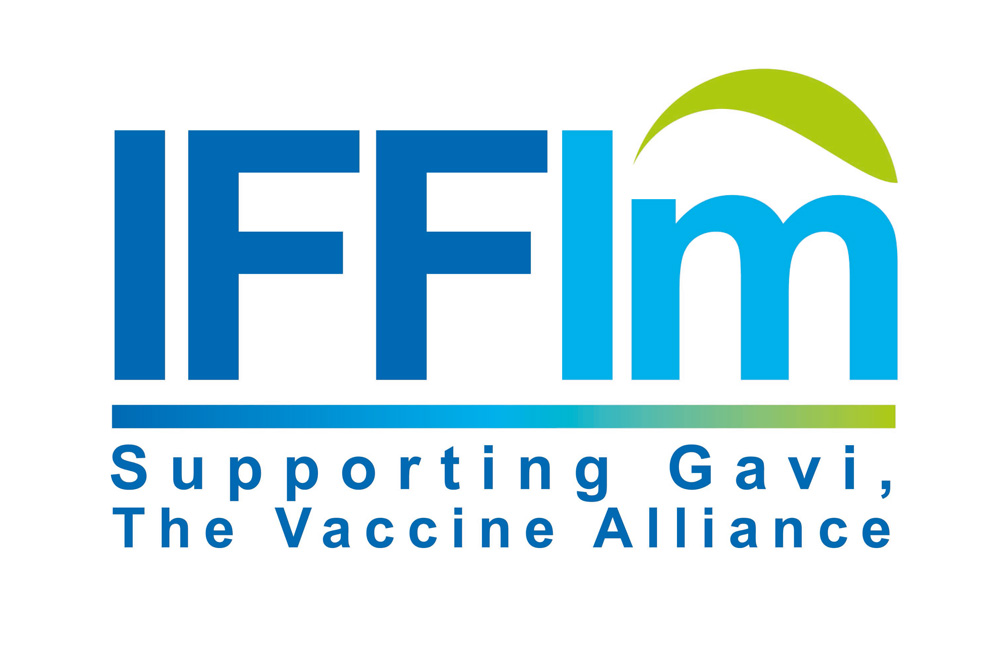Local solutions to local problems: Reaching zero-dose children in Chad’s nomadic communities
- Impact
- Local solutions to local problems: Reaching zero-dose children in Chad’s nomadic communities
Local solutions to local problems: Reaching zero-dose children in Chad’s nomadic communities
6 September 2022

Daoud Bechir, a Toubou tribe nomad, with his daughter, Florine, after she was vaccinated against polio in a nomad encampment in Wadi Fira province, Chad. Credit: Victor Muisyo
An innovative approach that combines children and animal vaccinations is helping to boost coverage amongst zero-dose children in Chad’s nomadic communities.
An innovative approach that combines children and animal vaccinations is helping to boost coverage amongst zero-dose children in Chad’s nomadic communities.
Announcements
IFFIm impact: Zero dose children
1 in 5 children in Africa have yet to receive a single vaccine. IFFIm supports Gavi’s strategy to immunise these "zero dose" children by providing 16% of Gavi’s overall programme support.
Daoud Bechir and his wife Aicha Koundja have just finished thatching their makeshift hut in Biltine, Wadi Fira province, some 837 kilometres east of Chad’s capital, N’Djamena.
Together with their four children, they are joining other Bedouins in a nomad encampment that will be their 13th home this year. A few metres behind their shelter in a rough and ready kraal, a goat bleats. A throng of children chases a football across the dusty compound.

However, despite the exuberance, none of these children have ever been vaccinated. Today is their day, and it’s not sheer luck: a dedicated team of men and women have been thinking about them.
One in five children in Africa has not received all their necessary and basic vaccines. Chad is one of the countries with the highest numbers of zero-dose children. The nomadic lifestyles of a significant part of the population is one of the reasons the numbers remain high. Their irregular movements make them hard for health authorities to reach.
“Vaccination starts today at 11am. It is free. Bring your children aged between nine and 59 months. Measles and polio are dangerous diseases. Bring them for vaccination, everything is free!”
However, thanks to a network of public health care workers, community volunteers, veterinarians and nomadic pastoralists supported by UNICEF, WHO and Gavi, vaccination coverage for nomadic children who have never had a single shot of any vaccine has helped to significantly shrink the number of zero-dose children in the Sahelian country.
“Vaccination starts today at 11am. It is free. Bring your children aged between nine and 59 months. Measles and polio are dangerous diseases. Bring them for vaccination, everything is free!” Rachit Moustapha, a community volunteer appeals through his megaphone as he trudges across the encampment with a laboured gait, having walked 15km from another nomad camp where a similar exercise is taking place.
“The Toubou [nomad tribe] love their animals. If you show concern for their livestock, you will win their interest and attention. That’s why it’s not very difficult to also get their children inoculated.”
Local problems, local solutions
This is one of a series of vaccination campaigns in Wadi Fira’s health departments of Biltine, Dar Tama and Kibe, where more than 2,100 children, 2,100 women and 52,000 cattle have so far been immunised.

Credit: Victor Muisyo
Organising vaccination activities for nomadic communities is not easy. Chad’s rural road network is next to unusable. Health facilities are scattered and sparse due to the low population density. Maintaining a vaccine cold chain is challenging as outside temperatures hit highs of 40°C. Despite the challenges, Chadian health authorities have partnered with humanitarian agencies, community leaders and volunteers to ensure every nomad child is reached.
“It’s hard to set up fixed vaccination points for [nomad groups]. Therefore, our best option is trailing their movements with the help of local veterinarians,” says the coordinator of MSF’s community activities, Aime Ndouh Kassir.
According to him, the recruiting and training of mobilisers, volunteers and vaccinators is the starting point. Trained volunteers and mobilisers are then dispatched to nomad camps with the help of village chiefs and veterinarians to teach nomadic parents about the importance of vaccination and the health risks of disease.
“The Toubou [nomad tribe] love their animals. If you show concern for their livestock, you will win their interest and attention. That’s why it’s not very difficult to also get their children inoculated,” explains Abou Saleh, a local chief in Biltine.
“I have been doing this for the last eight years. I will never get tired, as I understand the importance of getting our children vaccinated against these terrible diseases. I also understand these children are not privileged to have health facilities near them. So, I bring the health services to them.”

Once target nomad camps are identified and influenced, a vaccinator, a community mobiliser and a veterinarian are then deployed to carry out vaccination activities.
"When I arrive in these camps, I greet them and introduce myself. Next, I make them aware of my mission there and ask if there are any children aged nine to 59 months. I then request the mothers to make those children available for measles and polio vaccination,” explains Rachit Moustapha, a UNICEF-trained community mobiliser.
A man and his horse
Tahir Mahamat, 34, is one of the volunteer vaccinators devoted to immunising children in nomadic settings. On his horse, he travels a daily average of 21km from his health centre to nomad villages and oases. His target? Thirteen nomad camps and oases with at least 1,501 children between nine and 59 months who have not been vaccinated against measles and polio.
He fetches the vaccines from his supervisor every morning from the health centre in two cold boxes and saddles up to ride to an agreed meeting point where he catches up with a veterinarian and a local mobiliser, before they head off to the day’s vaccination sites in the nomad villages.
"Some mothers reject the idea of getting their children vaccinated. But because I am here frequently, most of them are familiar with me and the veterinarian,” explains Rakhie Moukhtar, a community mobiliser in Tahir’s company.
“I have been doing this for the last eight years. I will never get tired, as I understand the importance of getting our children vaccinated against these terrible diseases. I also understand these children are not privileged to have health facilities near them. So, I bring the health services to them,” Tahir explains.
Chad has previously experienced several measles outbreaks. In 2019, out of the126 health districts in the country, 123 reported suspected measles cases while 30 suffered an epidemic. However, vaccine coverage has also gone up by eight percentage points since 2019, thanks to such innovative campaigns and commitment through authorities, local leadership and community involvement. If these customised programmes and efforts are sustained and supported, it could be a potential indication that measles outbreaks and other vaccine-preventable diseases could become a distant memory in Chad.
Cold is gold
Maintaining the vaccine cold chain remains a big challenge in most developing countries. Chad is no exception. Since 1997, Chad has had only 26 high quality solar-powered vaccine storage and transport units. In 2021, Gavi installed an additional 1,155 units, increasing the CCE equipment rate to 92% in 2022. The installation sites were carefully selected to maximise impact and facilitate access to vaccination, according to Thierry Vincent, Senior Country Manager at Gavi.
 |
This article is republished from VaccinesWork under a Creative Commons license. Read the original article. |
Share this article
Restricted Access Library
 The material in this Restricted Access Library is intended to be accessed only by persons with residence within the territory of a Member State of the European Union and is not intended to be viewed by any other persons. The material in this Restricted Access Library is provided by IFFIm for information purposes only and the materials contained herein were accurate only as of their respective dates. Certain information in the materials contained herein is not intended to be, and is not, current. IFFIm accepts no obligation to update any material contained herein.
The material in this Restricted Access Library is intended to be accessed only by persons with residence within the territory of a Member State of the European Union and is not intended to be viewed by any other persons. The material in this Restricted Access Library is provided by IFFIm for information purposes only and the materials contained herein were accurate only as of their respective dates. Certain information in the materials contained herein is not intended to be, and is not, current. IFFIm accepts no obligation to update any material contained herein.
Persons with residence outside the territory of a Member State of the European Union who have access to or consult any materials posted in this Restricted Access Library should refrain from any action in respect of the securities referred to in such materials and are otherwise required to comply with all applicable laws and regulations in their country of residence.
By clicking Access restricted content: DYNAMIC-LINK-TEXT I confirm that I have read and understood the foregoing and agree that I will be bound by the restrictions and conditions set forth on this page.
The materials in this Restricted Access Library are for distribution only to persons who are not a "retail client" within the meaning of section 761G of the Corporations Act 2001 of Australia and are also sophisticated investors, professional investors or other investors in respect of whom disclosure is not required under Part 6D.2 of the Corporations Act 2001 of Australia and, in all cases, in such circumstances as may be permitted by applicable law in any jurisdiction in which an investor may be located.
The materials in this Restricted Access Library and any documents linked from it are not for access or distribution in any jurisdiction where such access or distribution would be illegal. All of the securities referred to in this Restricted Access Library and in the linked documents have been sold and delivered. The information contained herein and therein does not constitute an offer for sale in the United States or in any other country. The securities described herein and therein have not been, and will not be, registered under the U.S. Securities Act of 1933, as amended (the "Securities Act"), and may not be offered or sold in the United States except pursuant to an exemption from, or in a transaction not subject to, the registration requirements of the Securities Act and in compliance with any applicable state securities laws.
Each person accessing the Restricted Access Library confirms that they are a person who is entitled to do so under all applicable laws, regulations and directives in all applicable jurisdictions. Neither IFFIm nor any of their directors, employees, agents or advisers accepts any liability whatsoever for any loss (including, without limitation, any liability arising from any fault or negligence on the part of IFFIm or its respective directors, employees, agents or advisers) arising from access to Restricted Access Library by any person not entitled to do so.
"Relief" for mothers in Bayelsa state as malaria vaccine makes waves
07 November 2025
